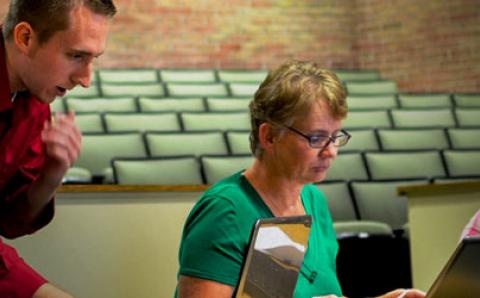Synod 1995 received an overture noting that at Synod 1994 only three of the 184 delegates were from ethnic minority communities. The overture asked synod to “include a minimum of 10 members from the various ethnic communities in the CRC to serve as advisers to synod . . . to help synod be alert to the perspectives of the nations (Agenda for Synod 1995, p. 395). Synod decided to appoint seven advisers.
In 2005 the committee that reviewed this practice recommended that the position of ethnic adviser continue as long as the number of ethnic minority delegates was less than 25—the number representing the highest number of ethnic minorities delegated to synod in a particular year (18) plus the maximum number of ethnic advisers approved by Synod 1995 (seven). Through this practice and by other means, the denomination has become much more sensitive to the need to bring ethnic minorities “to the table of policy and decision-making at the denominational level.”
What a contrast this is to the way we’ve dealt with women advisers! Because “the presence and input of ethnic advisers [had] been beneficial to synod and the churches” and because “women [could] make a valuable contribution to the work of synod,” Synod 2000 voted to “have up to seven women . . . serve as advisers” (Acts of Synod 2000, p. 699).
Synod 2008, the synod immediately following the synod that permitted women to serve as delegates, voted to no longer appoint women advisers because “Synod 2007 approved the appointment of women delegates” (Acts of Synod 2008, p. 479). But there was no encouragement for women to attend synod or for councils and classes to delegate women, perhaps because some classes really don’t wish to see women present.
If Synod 1995 had responded to the observation that there were only three ethnic minority delegates by simply saying “ethnic minorities may be delegated to synod,” we would not be as inclusive as we are today. The effect of these two different approaches is obvious. At Synod 2012, from a rather small pool of ethnic minority denominational members, 22 were delegated (18 actually attended) and four advisers were appointed. From a much larger pool of women members, only 15 served as delegates.
Those who have served with women know that their perspective enhances the ministry of the church. Though appointing advisers is a rather artificial way of bringing people “to the table of policy and decision-making at the denominational level,” we’ve considered it necessary to make sure that the voices of ethnic minorities, women, and youth are heard. Perhaps we need to reinstate the position of “woman adviser” until there is a critical mass of women delegates. The better alternative is for women officebearers to serve as synodical delegates and for councils and classes to bring women members to the table.
About the Author
George Vander Weit is a retired pastor in the Christian Reformed Church.







